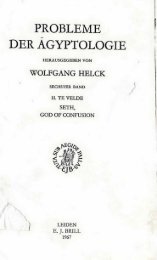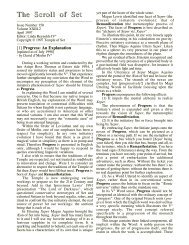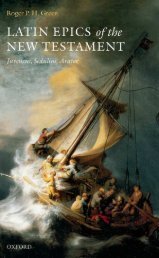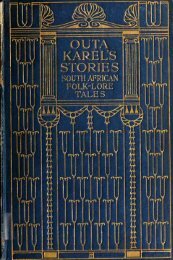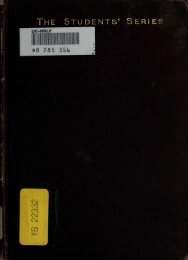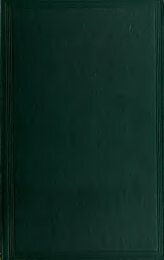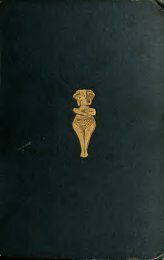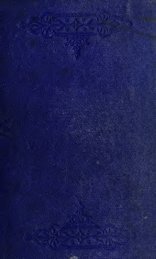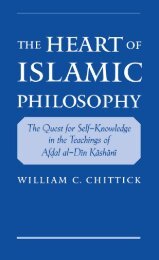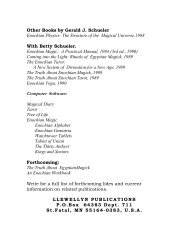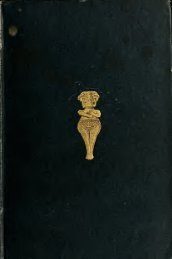Create successful ePaper yourself
Turn your PDF publications into a flip-book with our unique Google optimized e-Paper software.
22S MYTHOLOGY OF THE ARYAN NATIONS.<br />
BOOK<br />
II.<br />
tliese types that we are now concerned. If a convention<br />
should be made at all, why should it be with Hermes<br />
rather than with any other god? If it be answered that<br />
Hermes was the prince and patron of thieves, we have then<br />
to ask why this should be his character and whence the<br />
notion came. The mere pointing out of a contrast does not<br />
explain the origin of that contrast ; and Mr. Gladstone lays<br />
clown a principle of universal application when he says that<br />
' invention cannot absolutely create ; it can only work on<br />
what it finds already provided to hand.' 1 The criticisms<br />
of Colonel Mure 2 might have some force if we could suppose<br />
that the poet created his own materials ; but it is manifestly<br />
useless to explain as a jest the relations between Hermes<br />
and Apollon, until we have shown why these particular<br />
relations should be invested with a ludicrous character. It<br />
is strange that Colonel Mure should suppose that he had<br />
touched the real point at issue by asserting that in order to<br />
1 Homer and the Homeric Age, ii. 9.<br />
- History of Greek Literature, ii. 340.<br />
No wish to disparage the great learning<br />
of Colonel Mure or to depreciate his<br />
services in the important subject to<br />
which he devoted himself must be inferred<br />
from the expression of a conviction<br />
that he was incapable of analysing fairly<br />
any mythical narrative, the truth being<br />
that he knew nothing of the nature of<br />
myths in general. Thus in the present<br />
case he seems to have a fixed idea that<br />
his work is done when he says that the<br />
whole Hymn to Hermes is designed as a<br />
burlesque, that the absurdity is intended<br />
to lie in the contrast ' between the<br />
Herculean exploits of the divine urchin<br />
and his baby form and habits,' and that<br />
the supernatural element of the story<br />
'alone gives point and seasoning to<br />
an otherwise palpable extravagance.'<br />
There is not an expression throughout<br />
the whole hymn which implies any<br />
consciousness of extravagance or burlesque<br />
or absurdity on the part of the<br />
poet, who evidently writes in all possible<br />
seriousness. But with Colonel Mure<br />
almost all mythical incidents resolve<br />
themselves into the mere extravagances<br />
of a disordered or ill-regulated fancy.<br />
The hundred-headed narcissus, whose<br />
fragrance made earth and heaven smile,<br />
and which tpmpted Persephone to leave<br />
her companions in the fields of Enna,<br />
he is content to put aside as ' a<br />
monstrous hyperbole.' In point of fact,<br />
the poet chose the narcissus because its<br />
name denotes the deadly languor and<br />
lethargy which comes over the earth in<br />
autumn, and which is expressed more<br />
fully in the myth of Narkissos, the.<br />
counterpart of Endymion. (See page 33.)<br />
It is not, however, accurate to speak of<br />
the ' baby habits ' of Hermes. His childish<br />
ways are confined to the time which<br />
he spends in his cradle. As soon as he<br />
leaves it, he begins to move with giant<br />
strides, and nothing of the child remains<br />
about him. Colonel Mure adds that ' as<br />
the patron deity of cunning and intrigue,<br />
he is at once qualified to compete with<br />
and to surpass even Apollo, hitherto<br />
considered as unrivalled in these arts.'<br />
Thei'e is not the slightest ground for<br />
thinking that Apollon was at any time<br />
connected with the notion of cunning<br />
and intrigue, and still less for supposing<br />
that he was regarded as the embodiment<br />
or ideal of those qualities until the<br />
questionable honour was transferred to<br />
Hermes. It is, in fact, impossible to<br />
determine whether the myth of Phoibos<br />
has the priority of time over that of<br />
Hermes, and therefore we cannot say<br />
how the former was regarded before the<br />
latter furnished the notion of the Master<br />
Thief.



